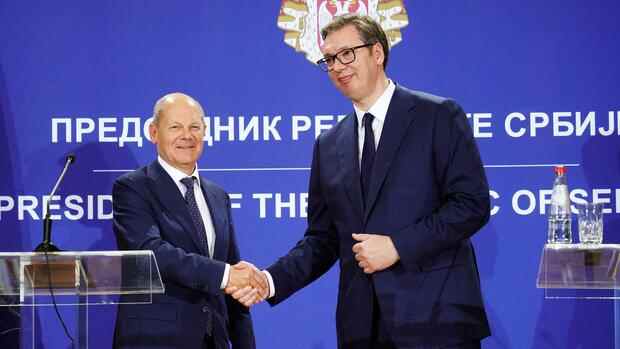With a view to possible EU accession, Scholz called for further reforms from the Western Balkan countries.
(Photo: Bloomberg)
Pristina, Belgrade Federal Chancellor Olaf Scholz (SPD) wants to get the stalled EU accession process for the countries of the Western Balkans going again. At the start of a two-day trip through the region, he pointed out on Friday in Kosovo that six countries aspiring to join the European Union had been promised membership 19 years ago. It is therefore important to “send a new sign of hope and confidence that this accession process is very serious,” said Scholz after a conversation with Prime Minister Albin Kurti.
In the Serbian capital of Belgrade, the Chancellor later made it clear that this also includes further reforms in the Western Balkan states. Specifically, after a conversation with Serbian President Aleksandar Vucic, he mentioned ensuring the rule of law and freedom of the media, as well as fighting corruption and organized crime. “Progress is required in each case.” Scholz acknowledged the judicial reform in Serbia, but said at the same time: “The further, the next steps must follow now.”
Serbia, Montenegro, North Macedonia and Albania are already EU accession candidates. Kosovo and Bosnia-Herzegovina are still waiting for this status. After the conversation with Scholz, Kurti announced that he would submit a formal application this year. He hopes for the support of the EU.
Even before his arrival in Belgrade, Serbia suggested Scholz to change course in Russia policy. “Anyone who wants to become a member of the European Union must accept the entire regime that is associated with it.” The sanctions imposed by the EU against Russia were one of them.
Top jobs of the day
Find the best jobs now and
be notified by email.
Scholz then said in Belgrade: “We expect that the sanctions will also be implemented by those countries that are moving in the EU accession process.” Vucic emphasized that Belgrade had condemned Russia’s attack in the UN General Assembly and other bodies. His country has a different attitude to the sanctions. Serbia is in a “very complicated situation” when it comes to energy supply.
Lavrov’s visit to Belgrade failed only because of neighboring countries
Serbia, with its almost seven million inhabitants, wants to become a member of the EU, but at the same time maintains friendly relations with Russia and China – two authoritarian countries with more than tense relations with the West. President Vucic actually wanted to receive Russian Foreign Minister Sergey Lavrov in his palace earlier this week. The visit failed only because the neighboring countries denied Lavrov the use of their airspace.
The EU is now increasingly openly calling on Serbia to show its colors. Scholz pointed out that the EU had a common line towards Russia. None of the countries willing to join should have any illusions about this.
In the meantime, all six Western Balkan countries have concluded a stabilization and association agreement with the EU. However, the rapprochement process has been stagnating for years. Serbia in particular is now more autocratic, more repressive and more destabilizing for the region than it was ten years ago.
In Bosnia and Montenegro, the political actors are blocking each other. Progress made by Albania, North Macedonia and Kosovo is not honored by the European actors. “Enlargement fatigue” is spreading across the EU, led by France, Denmark and the Netherlands.
No shortcut for Ukraine – with regard to the Balkans
Scholz wants to counteract this – also in order not to leave the field to players such as Russia and China as well as Turkey and the Gulf States. The EU must give a sign that the prospect of accession is seriously wanted and has a “realistic chance,” he said in Pristina. In Belgrade, the chancellor emphasized that in future the EU would only be successful as a “large, joint unit of democratic states”. “We will only be able to defend what is important to us if we do it together. And it would be good if the countries of the Western Balkans were there.”
Scholz also justifies his demand that there can be no shortcut to the EU for Ukraine by saying that the Western Balkan countries also owe this. At the EU summit on June 23 and 24, the EU states want to position themselves on the candidate status of Ukraine, Georgia and Moldova.
Scholz traveled to Greece on Friday evening. On Saturday we’re going to North Macedonia and Bulgaria – currently the most difficult construction site in terms of the accession process. Bulgaria is resisting negotiations with North Macedonia over a dispute over history and the rights of the country’s Bulgarian minority.
More: The possible express accession for Ukraine is dividing Europe.
